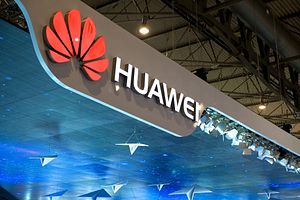To mark Holocaust Day last week, I read Corrie Ten Boom’s memoir The Hiding Place. After sheltering Jews from the Nazi regime, Ms. Ten Boom was sent to Ravensbruck concentration camp. She describes in the book her experience of doing forced labor for Siemens in the camps. The Holocaust saw state-sponsored mass enslavement on an appalling scale.
Her plight reminded me of the situation in the Xinjiang region in western China. Around 1 million Uyghur Muslims have been incarcerated and forced to work for nothing. Academics describe it as the world’s worst incident of state-sanctioned slavery.
Prime Minister Boris Johnson gave rousing speeches on Holocaust Memorial Day, saying “never again.” The U.K. government has admirably expressed its ambition to “lead the world” in its anti-slavery commitment.
But the next day, the U.K. National Security Council committed to sign over up to 35 percent of our 5G infrastructure to Huawei, a company that the government knows actively partners with the Xinjiang government to make the world’s most dystopian system of governance possible.
Caught up with concerns about national security, the debate about Huawei has largely ignored their activities in Xinjiang. The U.K. has been a leader in the public criticism of the persecution of Uyghurs in Xinjiang; rewarding major contracts to the architects of the surveillance system undermines this.
A recent report by the Australian Strategic Policy Institute shows that Huawei signed an agreement with the Xinjiang Public Security Bureau as early as 2011 to enable the development of “public security video surveillance.” They have developed the region’s cloud computing and data infrastructure, and have a partnership with the Xinjiang Television network to “maintain social stability and create positive public opinion.”
The 2018 announcement of one Huawei public security project in Xinjiang — as posted on a government website in Urumqi — quoted a Huawei director as saying, “Together with the Public Security Bureau, Huawei will unlock a new era of smart policing and help build a safer, smarter society.”
Safer, smarter policing is a euphemism that would make George Orwell roll in his grave. Huawei is making huge profits from Xinjiang’s unique techno-totalitarianism. A separate ASPI report highlights that they are exporting this technology to countries such as Ecuador, Pakistan, the Philippines, Venezuela, Bolivia, Zimbabwe, and Serbia.
The U.K. government was alerted to this report by a joint letter from Parliamentarians in December, but chose to sidestep the issue. Their reply to us ignored the need for the government to conduct the same human rights due diligence that they now demand of corporations.
This position is profoundly short-sighted. Britain has a role to play in upholding the international liberal order and human rights. The more dependent we become on firms whose ties with the Chinese state extend as far as the construction of Xinjiang’s surveillance technology, the harder it becomes to take a credible stance. The deeper our dependency become, the harder it is to stand for our values.
But equally as importantly, Huawei’s activities in Xinjiang should alert us to their true allegiances and values. Their willingness to create this mass surveillance technology exposes the true level of their devotion to and dependency on the Chinese central government. It should not surprise us if the warnings of security officials and others about national security come back to haunt us.
The most striking thing in the government’s Statement to Parliament was the repeated admission of the risks involved. Why take risks when alternatives are available? Why disregard the advice of trusted allies such as Australia and New Zealand — let alone the United States?
Lord Alton is an independent member of the House of Lords and a Patron of Hong Kong Watch.

































